
-
Find the right food for your petTake this quiz to see which food may be the best for your furry friend.Find the right food for your petTake this quiz to see which food may be the best for your furry friend.Featured products
 Perfect Digestion Small & Mini Adult Dog Food
Perfect Digestion Small & Mini Adult Dog FoodHill's Science Plan Perfect Digestion Small & Mini Adult Dog Food with Turkey is a complete premium pet food for small breed adult dogs aged 1–6 years. This deliciously smooth mousse is precisely balanced to deliver the appropriate amount of energy and to support digestive health in adult, small breed dogs.
Shop Now Hypoallergenic Small & Mini Adult Dog Food
Hypoallergenic Small & Mini Adult Dog FoodHILL'S SCIENCE PLAN Hypoallergenic Small&Mini Adult dog food with Salmon is complete pet food for adult small dogs 1–6 years old. It's formulated for dogs with delicate skin and stomach, with limited high quality novel protein sources & no grain.
Shop Now Perfect Weight Small & Mini Adult Dog Food
Perfect Weight Small & Mini Adult Dog FoodHill's Science Plan Adult Small & Mini Dog Food with Turkey is a complete premium pet food for adult small dogs from 1 year old that are prone to weight gain or slightly overweight. This deliciously smooth mousse is formulated to deliver the appropriate amount of energy to support weight maintenance in adult dogs.
Shop NowFeatured products Sterilised Mature Adult Cat Food
Sterilised Mature Adult Cat FoodHill's Science Plan Sterilised Cat Mature Adult Cat Food with Chicken is specially formulated with ActivBiome+ Multi-Benefit Technology. It is a precisely balanced nutrition tailored to meet the needs of mature adult sterilised cats, ages 7+, and to promote graceful ageing.
Shop Now Oral Care Adult Cat Food
Oral Care Adult Cat FoodHill's Science Plan Oral Care Adult Cat Food with Chicken contains clinically proven kibble technology to reduce plaque & tartar build up.
Shop Now Urinary Health Adult Cat Food with Chicken
Urinary Health Adult Cat Food with ChickenHill's Science Plan Urinary Health Adult Cat Food with Chicken supports the health of the whole urinary system. Suitable for sterilised cats.
Shop Now -
Dog
- Dog Tips & Articles
-
Health Category
- Weight
- Food & Environmental Sensitivities
- Urinary
- Digestive
- Joint
- Kidney
-
Life Stage
- Puppy Nutrition
- Adult Nutrition
- Senior Nutrition
Cat- Cat Tips & Articles
-
Health Category
- Weight
- Skin & Food Sensitivities
- Urinary
- Digestive
- Kidney
-
Life Stage
- Kitten Nutrition
- Adult Nutrition
Featured articles Tips For Mixing Wet And Dry Pet Food
Tips For Mixing Wet And Dry Pet FoodDiscover tips for mixing wet and dry pet food to ensure balanced nutrition and variety for your pet. For comprehensive feeding advice, visit Hill's Pet UK.
Read More Virtual Vet Visits: What You Need to Know
Virtual Vet Visits: What You Need to KnowLearn the ins and outs of a televet appointment before you talk to a vet online.
Read More Develop your gut instinct | Hill's Pet
Develop your gut instinct | Hill's PetDigestive disorders can affect any part of the digestive system, from the stomach, small intestine and through to the large intestine.
Read More -


No pet parent likes to hear that sound: the hacking noise from the other room that tells you are going to have a mess to clean up. When your cat starts gagging, the first thought that might go through your head is: "Oh no, what did they get into now?" There are many reasons why your cat might throw up, some of them more serious than others. For example, occasional vomiting may simply be down to natural changes as your cat ages, but regular vomiting might indicate a problem or abnormality. Whether you're a new or seasoned cat parent, it's important to know the reasons your cat may be vomiting and when it warrants a visit to the veterinarian.

Hairballs: A Common Cause of Cat Vomiting
Cat vomiting might be due to eating something they shouldn't, like part of a houseplant or a toy, but your cat can also get an upset stomach from ingesting hair during grooming. This most often resurfaces as a hairball.
Although a cat vomiting up a hairball every so often is normal, there are times when you may need to be concerned. Hairballs shouldn't be painful, frequent or difficult for your cat to pass. Untreated hairballs can also go the other way and, according to the PDSA, can cause painful intestinal blockages.
Keep track of your cat's normal routine and watch out for signs of constipation, lethargy, and loss of appetite if they have not passed a hairball in a while. If your cat has a consistent hairball problem, you might want to look into a cat food that is formulated for hairballs.
Cat Vomit Diagnostic Hacks
A hairball every now and then (often with foamy or yellow liquid) may not be a reason to call your vet. However, if your cat starts vomiting frequently or the hairballs are large and seem to be causing your pet discomfort, you may want to take your feline friend in for a checkup.
Your vet will first try to determine if the vomiting is caused by hairballs or if your cat has ingested any harmful objects or substances in the home. If the vomiting is long term or severe, the MSD Veterinary Manual says that the vet may conduct investigations like blood, faeces or urine tests, abdominal ultrasounds or x-rays, or endoscopic (internal camera) evaluation.
It's helpful to know that most vets will approach cat vomiting this way so that you can gather useful information prior to your appointment. When you visit your vet, be prepared to describe your cat's recent surroundings, activities, and the frequency and appearance of their vomiting.


Tasty Tips
Other Reasons for Cat Vomit
If your cat vomits but resumes regular activities, continues to eat, and seems otherwise healthy, you may not have much to worry about. For example, sometimes cats vomit undigested food shortly after eating. This can happen when your pet eats the food too fast. In these cases, you may just need to feed your cat smaller, more frequent meals.
However, in some cases, frequent or excessive vomiting may be the result of a serious condition. A number of different diseases such as kidney and liver disease can cause vomiting. Food allergies, intestinal parasites and infections can also result in vomiting. Testing is needed to help determine the cause and find the best solution to help your cat.
Food Sensitivities
Some cats can also experience digestive turmoil from food sensitivities. Pay close attention to any behaviours your cat exhibits before and after eating. Besides vomiting, do they have diarrhoea, bald patches or itchy skin? Discuss these observations with your vet and take your vet's advice on food changes and medications that your pet may need.
Do not attempt to diagnose your cat's food sensitivity at home, since changing their food on your own could end up upsetting your cat's stomach more if not done properly.
Always err on the side of caution, and if something doesn't seem right, get your cat to the vet immediately. Every cat is different and your vet is the person best qualified to diagnose the underlying issue that is causing your cat to throw up.
Ways to Prevent Cat Vomiting
Wouldn't all pet parents love to know the secret to eliminating vomiting? Or even a way to train your cat not to do it on your bed or carpet? Unfortunately, there's no magic trick, but there are a few things you can try to ease your cleanup and your kitty's discomfort.
If your cat is vomiting hairballs, make sure to brush your cat regularly, keep them active, and feed them a properly balanced food designed to help cats with hairballs.
To help keep your cat’s stomach happy, give them the type and amount of food recommended by your vet and have clean, fresh water available at all times. If your cat eats too quickly, you can try a puzzle feeder or a dry food with large, crunchy pieces to slow them down. If your veterinarian recommends medications or therapeutic foods, it's important to follow their instructions in order to keep your cat healthy. Be sure your cat sees the vet regularly and discuss your concerns.
Though cleaning up messes and bodily fluids is something all pet parents will experience at some point, following these tips and knowing when to seek the help of a professional can hopefully make these experiences few and far between.


Chrissie Klinger is an educator, writer and mother of two children, three dogs and three cats. Her dog Jake loves sitting on her lap every chance he gets! She enjoys living an active and eco-friendly lifestyle in rural Pennsylvania.
Related products

Hill's Science Plan Urinary Health Adult Cat Food with Chicken supports the health of the whole urinary system. Suitable for sterilised cats.
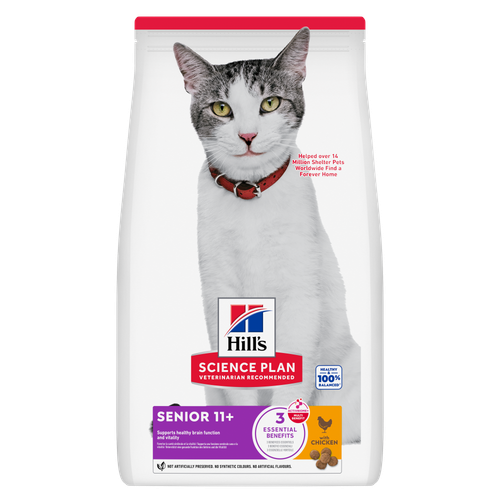
Hill's Science Plan Senior Cat Food with Chicken is a complete pet food, specially formulated with ActivBiome+ Multi-Benefit Technology.
This food supports healthy aging during the golden years. Contains a special ingredient blend to help keep older cats agile, more alert & interactive.

Hill's Science Plan Sterilised Cat Mature Adult Cat Food with Chicken is specially formulated with ActivBiome+ Multi-Benefit Technology. It is a precisely balanced nutrition tailored to meet the needs of mature adult sterilised cats, ages 7+, and to promote graceful ageing.

Hill's Science Plan Oral Care Adult Cat Food with Chicken contains clinically proven kibble technology to reduce plaque & tartar build up.
Related articles
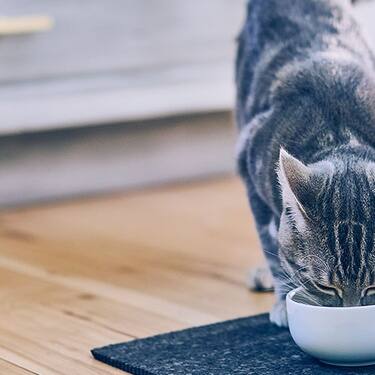
Good nutrition is about the right balance of nutrients. Learn more about health issues when feeding a cat food that has an improper nutritional balance from your friends at Hills Pet Nutrition.
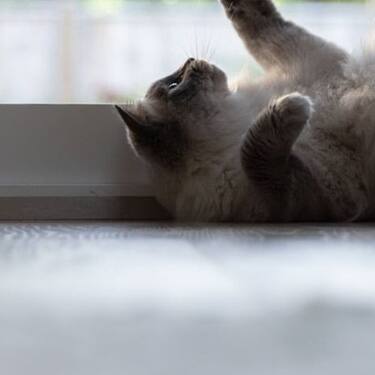
Feeding time can be a wonderful bonding opportunity for you and your cat. Find out how to make the most of it and create a healthy habit with HIll's Pet UK.
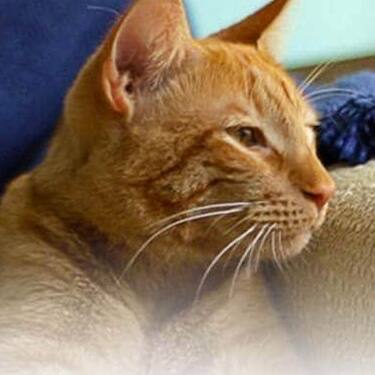
Find the right Hill
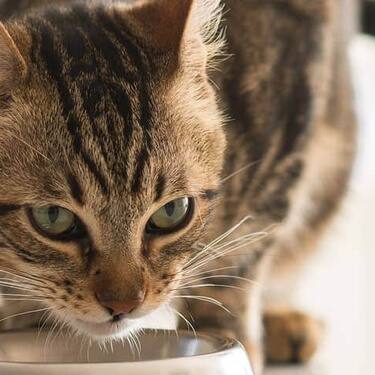
Discover what you can do to spot and support a sensitive cat stomach. See what routines and food you can implement to help your cat be happy and healthy.

Put your cat on a diet without them knowing
Our low calorie formula helps you control your cat's weight. It's packed with high-quality protein for building lean muscles, and made with purposeful ingredients for a flavourful, nutritious meal. Clinically proven antioxidants, Vitamin C+E, help promote a healthy immune system.
Put your cat on a diet without them knowing
Our low calorie formula helps you control your cat's weight. It's packed with high-quality protein for building lean muscles, and made with purposeful ingredients for a flavourful, nutritious meal. Clinically proven antioxidants, Vitamin C+E, help promote a healthy immune system.

